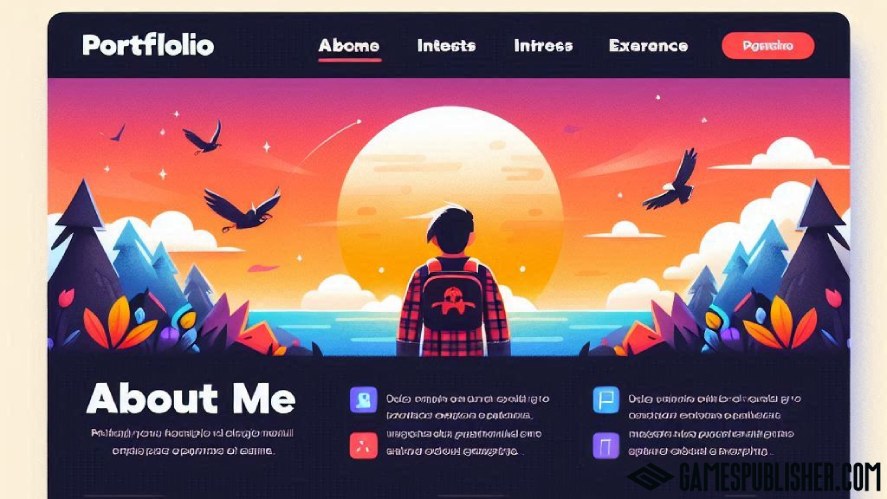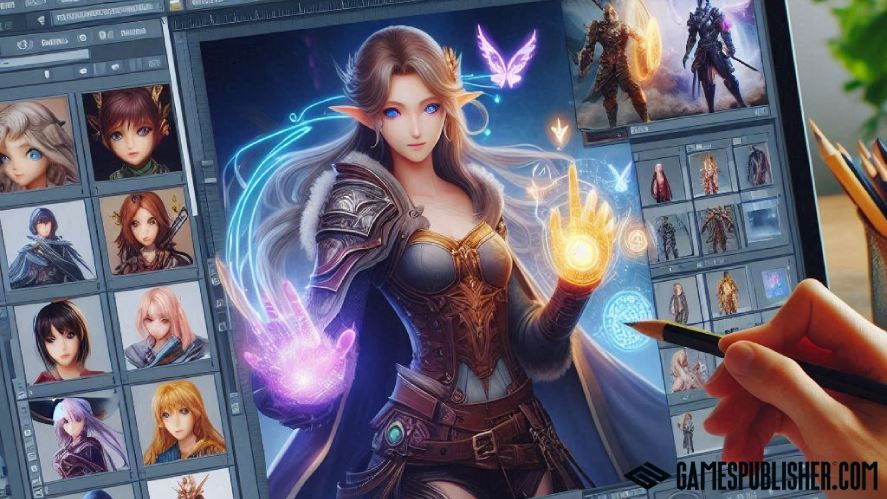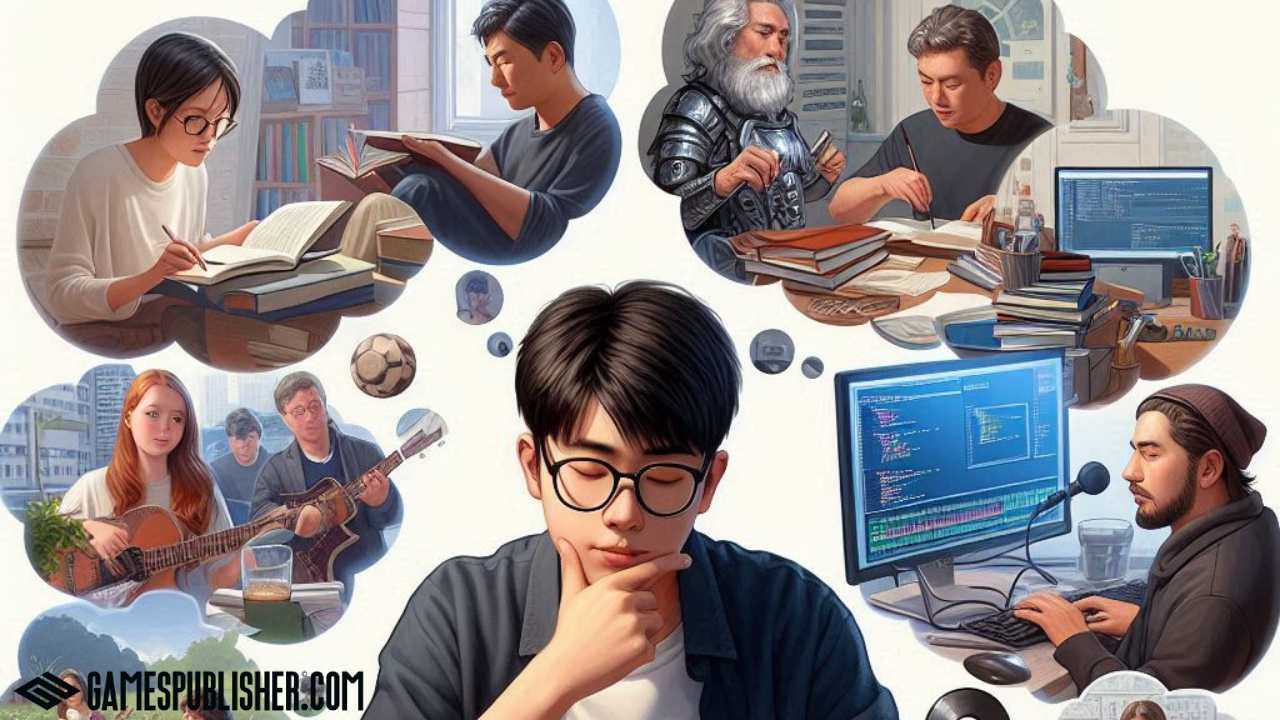Are you imagining yourself as a game creator, crafting exciting stories about the gaming world, or passionately pursuing your love for gaming?
Nowadays, the digital landscape is constantly changing. That has attracted many ambitious developers around the world to participate.
This exciting journey requires you to have the necessary knowledge to turn thoughts into reality.
So, read on to learn the various skills you need to become a game developer!
Understanding the Role of a Game Developer
Game development is a detailed and complex journey, combining many talents to create digital works of art.
To be truly successful with video games requires various skills and specializations. So, it’s essential to understand the diverse roles that contribute to your process.
Game Designers
Game designers are the creators of a game’s idea and structure.
They must carefully plan the mechanics, story, and user experience, setting the rules and systems that make the game come to life.
Additionally, game designers balance fun and challenge to ensure the game is interesting and exciting. Their minds create detailed stories, character developments, and dialogues, adding depth to the gameplay.
Game designers also plan the layout and goals of game levels, creating a smooth and enjoyable journey for players.
Programmers
Programmers who create video games are skilled in technology and write the code that forms the game’s foundation.
They will also build and improve game engines, the critical frameworks that support the creation and operation of games.
Moreover, programmers will create mechanics and physics and manage artificial intelligence and user interfaces to ensure everything works well.
To deliver a final product, they work on making the game run well on different devices and platforms, including fixing bugs and improving stability.
Artists
Visual experts design the game’s appearance, including characters, environments, textures, and animations in both 2D and 3D.
They start with their creative illustrations, while 3D modelers and animators bring these ideas to life. On the other hand, texture artists add detail and realism.
Moreover, UI/UX designers create easy-to-use, attractive interfaces that improve the player’s experience.
Other Specializations
Besides the leading roles, game development benefits from many specialized roles.
Sound engineers incorporate audio elements like extraordinary noises, background tunes, and spoken lines to create a more immersive experience.
Quality assurance (QA) testers carefully test the game, looking for bugs and giving feedback to ensure a smooth player experience.
Producers manage timelines and team collaborations, guiding the project to successful completion.
Writers create scripts, dialogues, and in-game text, making stories that resonate deeply.
Marketing and community managers build anticipation and support a lively player community, ensuring the game’s lasting success.
The Game Development Process
Game development is a detailed and repetitive journey spanning several stages.
Let’s explore these stages, from concept to post-release support!

Pre-Production
During this stage, you must develop ideas, consider the market trends, and target audience preferences.
You also need a GDD (game design document). It includes the plot, characters, gameplay mechanics, and technical requirements of the game.
You also need to create a prototype to help you examine important gameplay mechanics and identify potential challenges early.
Production
Once the plan has been established and approved, the project moves into production.
This is when the development team starts building a realistic game based on GDD.
This process requires many different roles and areas of expertise, such as programmers writing the code, artists designing and creating the images, and sound engineers creating the music and sound effects.
In addition, level designers create game environments, scenarios, and gameplay challenges.
Testing
In this process, dedicated testers thoroughly check the game on other platforms.
Similarly, User Experience (UX) testing evaluates usability and overall player experience. This helps developers receive suggestions to improve the game.
Additionally, localization testing helps ensure that translations and documentation for global releases are accurate.
Post-Release Support
The game’s launch marks the beginning of its lifecycle, so post-release support is crucial for maintaining success.
Developers must release patches to fix bugs and optimize game performance, then communicate changes to players through patch notes.
Moreover, developers need to gather feedback, build loyalty, and maintain gamers’ interest over time.
Educational Requirements
Education plays a crucial role when embarking on a journey into game development.
Regarding game developer education requirements, game developers must gain specialized degrees and skills to build a strong foundation and achieve success.

Formal Education
The journey into the video game industry often begins with formal education, focused on specific disciplines essential to the field:
- Computer Science: This degree is essential as it helps you learn deep programming and algorithm mastery.
- Game Design: You will be involved in an artistic environment with the concepts of game creation.
- Software Engineering: This course equips you with project management and system architecture skills.
Self-Learning and Online Resources
For aspiring game publishers who may not pursue a formal degree, self-learning and online resources offer a viable and flexible alternative pathway.
Game developers can provide the necessary skills and knowledge through online courses, tutorials, and self-study materials on Google.
Courses on gaming platforms like Udemy, Coursera, and edX also offer game development knowledge.
Additionally, YouTube channels and forums dedicated to game development offer practical insights, problem-solving strategies, and community support.
This self-directed approach fosters independence and adaptability and allows you to progress at your own pace.
Essential Subjects and Skills
To become a proficient game developer, mastering several essential subjects and skills is crucial.
By focusing on these sections below, aspiring game developers can build a solid foundation and successfully navigate the complexities of game development.
- Programming Languages: Becoming good at programming languages like C++ and Python is essential. C++ is commonly used in game engines because it works well in situations that need high performance.
- Mathematics: A strong foundation in mathematics is indispensable. Concepts such as linear algebra, calculus, and geometry are extensively used in game development.
- Physics: Your knowledge of mechanics, kinematics, and dynamics helps implement accurate movement, collision detection, and object behavior.
- Design Principles: This includes gameplay mechanics, user interface (UI) design, level design, and the overall user experience (UX). Knowing these principles makes games engaging, easy to use, and fun for players.
Building a Portfolio
Making a solid portfolio is vital for yearning developers looking to enter the competitive industry.

Importance of a Portfolio
A portfolio goes beyond a traditional resume, becoming a visual story that provides employers or collaborators with tangible proof of capability.
It showcases key projects that highlight game developer skills in programming, design, and artistic innovation.
Moreover, employers value such demonstrations as distinguishing you from a crowded field of applicants.
So, a good portfolio should include:
- Completed Games: Display original creations, highlighting significant roles and contributions.
- Game Assets: Showcase artwork, animations, 3D models, or sound compositions demonstrating artistic skill.
- Code Samples: Provide excerpts from coding projects to showcase your technical proficiency.
- Design Documentation: Present concept art, level plans, or detailed design documents illustrating creative processes.
- Collaborative Projects: Demonstrate teamwork through joint ventures emphasizing collaborative synergy.
Creating Your Own Games and Showcasing your work
Starting personal game projects, regardless of scale, demonstrates your passion and skill in game development.
Developers can begin with small projects or Game Jams.
Starting small allows developers to refine skills, explore new ideas, and manage game development from start to finish.
Game Jams and timed events with specific themes offer you valuable experience and add tangible achievements to the portfolio.
These help you provide opportunities for feedback, fostering continuous growth in game development skills.
Next, online platforms like GitHub or LinkedIn for code repositories can be used to create websites showcasing projects with precise descriptions and visuals to connect with industry professionals.
Additionally, providing contact information will make it easy for others to reach out.
Moreover, share project updates and participate in discussions on platforms like Twitter, Reddit, or specialized forums to showcase expertise and build a reputation in the industry.
Gaining Practical Experience
Game developers should start with internships, entry-level jobs, team projects, and freelancing.
Each path offers different benefits and growth opportunities in game development.

Internships and Entry-Level Jobs
The value an internship brings to you is not negligible because, thanks to opportunities like this, you can improve your experience thanks to veteran experts.
Imagine being in the middle of the action, learning from experienced developers, contributing to real projects, and understanding the workflow of a busy game development studio.
It’s like stepping into a playground full of opportunities, where the result could be a permanent role or an excellent reference for future jobs.
But how can you find these valuable internships?
Keep a close watch on game studios’ game developer career sections, check job boards dedicated to the gaming industry, and visit university career centers.
Networking is also a powerful tool—industry events, social media platforms, and professional associations can reveal hidden opportunities.
And don’t forget, a great online portfolio showcasing your projects can make potential employers take notice.
On the one hand, entry-level jobs are the starting point in the game development world.
Roles like junior developer, QA tester, or game designer assistant can provide a starting point, offering opportunities to learn and grow within a company.
While these positions usually require basic knowledge of game development tools and languages, such knowledge can be gained through formal education or self-study.
Collaborative Projects
Teamwork and collaboration are essential in game development. They can be demonstrated by participation in group projects or joining indie game development teams.
Besides that, collaborative projects are where teamwork and communication skills are built.
Working in a team helps you understand different roles, improve your idea-sharing abilities, and manage project timelines. It’s like a practice for working in a professional game studio.
Additionally, joining indie game development teams or group projects can be an exciting experience.
These projects often require participants to handle multiple tasks, offering a rich and varied experience.
Furthermore, platforms like itch.io, TIGSource forums, and game development subreddits are busy places where you can find indie projects looking for collaborators.
Freelancing and Contract Work
The freelancing world offers flexibility and variety.
It’s a space to work on many projects, build a diverse portfolio, and gain experience with different genres, platforms, and team dynamics.
This wide range of experience can be handy when applying for full-time roles, showing your adaptability and broad skills.
To elaborate, you can start a freelance career by creating a professional portfolio that showcases your best work through websites like Upwork, Freelancer, and Fiverr.
Besides, keeping up with industry trends for long-term success in freelancing is essential.
Networking and Community Involvement
In any industry, technical skills alone aren’t enough for success. Your professional network and involvement in the community will be a big part of that.
So, let’s explore some effective strategies for networking and community involvement!

Attending Industry Events and Joining Online Communities
Imagine the buzz of conversation, the excitement, and the energy at the Game Developers Conference (GDC).
These gatherings are more than just events—they’re places for connection and growth.
You can show your work, learn about new trends, and meet industry leaders on that occasion.
And let’s not forget the valuable opportunities these events offer: potential collaborations, job openings, and lasting professional relationships.
Moreover, platforms like forums, social media groups, and specialized game development hubs are places where knowledge is shared freely. Individuals can exchange ideas, seek advice, and collaborate on projects here.
Being active in these digital spaces keeps you updated on industry trends and promotes a culture of learning and support.
Additionally, you can enhance your reputation and visibility in the industry due to your efforts of engaging in discussions, contributing to group projects, and helping others.
Learning from Mentors
In the dynamic world of game development, mentors offer valuable advice and steadfast support to aspiring creators of this continually changing landscape.
With their knowledge, mentors can help you navigate challenges, make wise career choices, and improve your skills.
Building a mentor-mentee relationship involves reaching out to experienced professionals, showing a genuine willingness to learn, and being proactive and respectful.
Specializations and Career Paths
The game development industry is dynamic. This not only requires human creativity but also needs support from technology.
Therefore, game development also offers many career paths. Regardless of your choice, each has its own skills and duties.
Below is an overview of critical roles and potential career transitions within game development and emerging fields.

Different Roles in Game Development
To become a professional game creator, let’s explore the following roles!
Game Design
Game designers shape a game’s concept and mechanics, crafting rules, storylines, characters, and levels to enhance player experience.
This role includes the following responsibilities:
- Developing game concepts and detailed storylines.
- Designing immersive game environments and levels.
- Creating engaging game mechanics and systems.
- Drafting comprehensive design documents.
Programming
Game programmers bring the designer’s vision to life through coding, ensuring smooth platform functionality.
This role involves tasks like:
- Writing and maintaining robust code for game systems.
- Debugging and optimizing performance.
- Implementing graphics, audio, and AI components.
- Integrating gameplay features in collaboration with designers.
- Ensuring seamless cross-platform compatibility.
Art and Animation
Artists and animators bring the game’s look to life by creating detailed characters, beautiful environments, and unique effects, making the visuals come together perfectly.
Your duties include:
- Crafting concept art and visual designs.
- Creating 3D models and textures.
- Animating characters and their movements.
- Developing captivating visual effects.
Sound Design
Sound designers create the auditory atmosphere of a game with music, sound effects, and voiceovers, enhancing immersion and providing essential feedback.
To be a sound designer, you must have some responsibilities like:
- Composing music and designing sound effects.
- Recording and editing voiceovers.
- Implementing audio assets into the game engine.
- Mixing and mastering audio for various platforms.
Project Management
Project managers lead game development projects, carefully guiding your team to completion.
You also manage schedules, budgets, and quality standards, ensuring every milestone is met accurately and with high quality.
Specifically includes:
- Planning and scheduling project timelines meticulously.
- Efficiently managing budgets and resources.
- Coordinating between teams and departments.
- Meeting milestones and deadlines accurately.
- Proactively addressing risks and resolving issues.
Transitioning Between Roles
The dynamic nature of game development allows for fluid career transitions.
Skills from one area can often transfer to another, enabling developers to shift their focus as their careers progress.
Designers proficient in game mechanics can transition to programming by mastering coding languages and software development.
Meanwhile, programmers with solid organizational skills often move into project management roles, utilizing their technical expertise to coordinate development processes effectively.
Finally, artists and animators passionate about aesthetics can pivot to game design, leveraging their creativity to develop engaging concepts and levels.
Exploring Emerging Fields
Developers have new opportunities for game development like virtual reality (VR), augmented reality (AR), and mobile gaming.
With VR, you need 3D modeling and programming skills to create a unique game that looks realistic.
On the other hand, AR mixes digital content with the real world, providing rich and interactive experiences.
Mobile gaming is also booming with easy-to-use interfaces, sound UX principles, and global reach.
Using touchscreen controls and location-based features, developers can create engaging experiences that attract a broad audience worldwide.
Challenges and How to Overcome Them
Navigating the complex terrain of game development presents aspiring developers with numerous challenges, each requiring a mix of technical skill and personal resilience.
From grappling with the rapid pace of technological advancements to balancing professional ambition with personal life, the journey is filled with complexities that demand adaptability and determination.

Common Obstacles
Mastering the development tools can be a daunting uphill battle against steep learning curves for newcomers.
The constant need to learn, apply, and innovate can overwhelm even experienced developers.
Also, game development can be harmful to personal well-being.
You can face managing work-life balance, including intense schedules, tight deadlines, and pursuing excellence for your game.
So, balancing professional commitment with personal fulfillment becomes a delicate tightrope walk, where burnout poses a persistent threat.
After all, cultivating interests beyond coding becomes crucial yet challenging in a field where dedication often leads to exhaustion.
Strategies for Success
Addressing these challenges requires some strategies to achieve success.
Developers can follow some tips to help solve the problems raised above:
- Continuous Learning: Foster a hunger for knowledge by exploring new frameworks, methodologies, and industry trends through immersive courses, collaborative workshops, and vibrant developer communities.
- Master Time Management: Remember to prioritize tasks effectively, setting ambitious, achievable goals that respect professional commitments and personal interests.
- Fuel Passion with Purpose: Engaging with industry events, collaborating with peers, and consuming stimulating content nurtures a steadfast commitment to your craft, infusing creativity and perseverance into every project.
Conclusion
After all, beginning as a game developer is a stimulating journey filled with challenges.
So remember that real success comes from mastering skills, embracing growth, and staying engaged with the community.
After the sketched-out steps, you will turn your thinking into a real success.
Remember, the game development industry is ever-evolving, and staying engaged with the community and keeping your skills sharp are keys to long-term success.
Loading survey...

